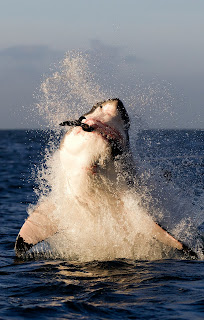 |
| Air Jaws, courtesy Discovery |
I believe in monsters, and one bit me on the foot – a small one. I grew up on the beaches of Florida and was literally in over my head one day. It isn’t as if I was in that deep of water for an eight or nine year-old, but it was deep enough I was bouncing up and down, launching off the sand below, to keep popping my head up for air. Adults were all around me, but none of that mattered when I bounced down and something clamped on.
There was a tough, alien feeling below my feet immediately preceding the pain that sunk in. Right underneath the part of my brain that was processing that pain – a lot of it - was a thought of “shark, shark, shark!
This was happening probably two years before Discovery Channel launched Shark Week in 1988, more than a decade after Jaws made America afraid to go into the water – but still probably a year before Jaws 4 made it personal (and personally helped to ruin Michael Caine’s career for another decade).
A kid who wanted to be a marine biologist well into high school, and who attended “sea camp” with his eighth grade class, I have always been a bit of an ocean nerd, and specifically a shark nerd. And Shark Week, launching its twenty-fifth year on Aug. 12 on Discovery, has been one of my holidays. Referred to in my home as Sharkmas, Sharkmukkah and Shar-kwanzaa, it is a yearly celebration of Mother Nature’s ultimate predators.
Previously hosted by Adam and Jaime from MythBusters, Craig Ferguson and Andy Samberg, the event is part of our pop-culture lexicon. Nearly 27 million people tuned in to watch Shark Week in 2011 to see half-crazy (or “passionate”) scientist drop themselves in cages underwater, or on sleds above water, to gather data on the beasts – and to introduce us to new phrases like the leaping great white “Air Jaws,” which explodes out of the water for a seal meal.
The emphasis off Shark Week is on understanding and education. Yet over the course of eight specials – including a new “Air Jaws” entry, a special MythBusters episode, an examination of the impact of Jaws on sharks and interviews with shark attack survivors – there is definitely an acknowledgement that, yeah, these things can eat us up real good.
This is something I can personally relate to every time I go to a beach, snorkel in deep water, watch Jaws or even listen to Jimmy Buffett’s “Fins.”
Again, I probably should have been born with gills for as much time as I spent in the ocean. I was snorkeling in the Florida Keys with a conservationist family friend involved in the “Save The Manatee” movement at such an early age that images of coral, colorful fish, freaky fish, rays, manatees and even sharks are among my earliest.
The ocean was not something I was raised to be afraid of. Respect it, yes, but not fear it. But when you’re a kid and a monster from the world below you is literally reaching up to grab you, things feel different. The thing unlatched from me right away, and although I bled what looked like a lot, I was fine. I only caught a glimpse of the shape, and I believe it to have been a nurse shark.
But at the moment of the bite, that thing may as well have been an extinct megalodon coming for me.
Humans are not obviously equipped to survive in the water for long, and when our meaty legs are dangling under the surface – or our plumpy, meaty midsections are floating around, seal-like – it is difficult not to think about how vulnerable we are. And when a shark is encountered “out there,” in the water, an alert part of brain helpfully reminds us that the water is the domain of this thing, and we don’t belong.
Even still, when I’m underwater, my mind sometimes wanders to the scene in Jaws when Richard Dreyfuss’ Hooper discovers Ben Gardner’s corpse while on a night dive. It still startles the little kid in me (and maybe the bigger kid, too). Deep down I think about how my sister would read about sharks and shark attacks – on the way to the beach. It was like reading ghost stories around a campfire, except we had no evidence supporting the existence of the Amityville ghosts but the creature from Amity Island was another matter. And the crew of the U.S.S. Indianapolis also occasionally enters my thoughts.
But the larger point here is that I kept going back in the water after my little incident. That’s the message of Shark Week. Despite the horror stories of attacks – despite how good they are at eating everything - sharks may seem like monsters, but they aren’t out to get us and don’t pose a real threat. And obviously the dwindling shark population has more to fear from humans than we do of it.
The ocean is a perfect place to be humbled by Mother Nature, and only education and respect (or blissful ignorance) can prevent one’s slide into terror. But that is another reason why shark nerds love Shark Week; it is a chance to appreciate the raw, bloody, brutal beauty of nature outside of us.
Beyond the buckets of chum that are spilled and the amazing slow-motion footage of sharks getting chompy, Shark Week is an opportunity to confront primal fears of our own weakness or insignificance, fears of something so perfectly designed to kill.
